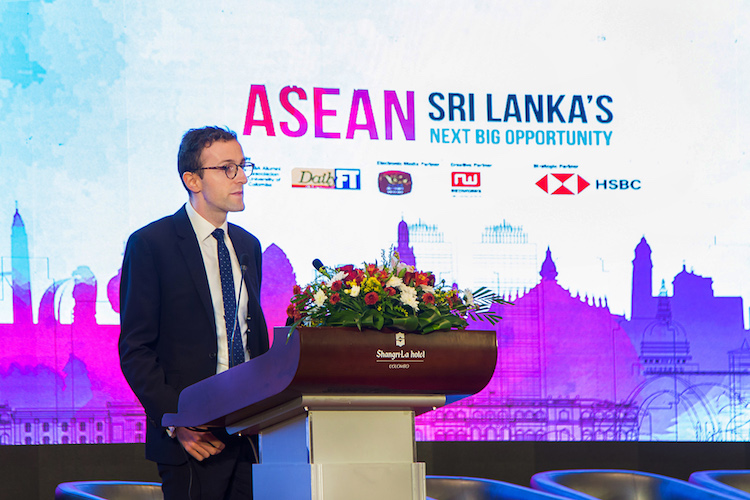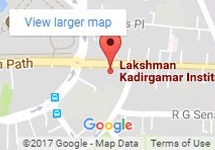
Reading Time: 3 min read
Adam Collins, Research Fellow at LKI, was invited to speak at the forum ASEAN: Sri Lanka’s Next Big Opportunity, held on 11 June in Colombo. Organised by the Daily FT and the University of Colombo MBA Alumni Association, with the strategic partnership of HSBC, and the event convened a range of international and local experts to explore how Sri Lanka can maximise the benefits of its relations with ASEAN. Hon. Malik Samarawickrama, M.P., Minister for Development Strategies and International Trade and M.P., and Dr. Indrajit Coomaraswamy, Governor of the Central Bank of Sri Lanka, also presented their views at the forum. The event drew a diverse audience, which included both public and private sector representatives.
In a presentation titled Does Sri Lanka’s Future Lie with ASEAN?, Mr. Collins highlighted the potential opportunities of Sri Lanka’s growing relationship with ASEAN. In particular, he noted that ASEAN is a potentially lucrative market for the country’s exports as the group has a population of over 600 million and accounted for 3.5% of global GDP, as well as 7.3% of world goods trade, in 2017. Closer ties with ASEAN would also give Sri Lanka the opportunity to integrate into existing global value chains in Southeast Asia and thereby, diversify its exports.
However, despite this potential and the country’s strong diplomatic ties with ASEAN (including membership of the ASEAN Regional Forum), Mr. Collins noted that Sri Lanka’s trade and investment relationship with ASEAN is currently underexploited. While around 15% of Sri Lanka’s goods imports came from ASEAN in 2017, it was the destination for only 5% of the country’s goods exports. Meanwhile, a lack of data means that the scale and scope of trade in services between Sri Lanka and ASEAN are unknown, but this too appears to be relatively small. ASEAN, in particular, appears to be an untapped market for Sri Lanka’s tourism sector—only 5% of Sri Lanka’s tourist arrivals were from ASEAN countries in 2017. Mr. Collins argued that there was substantial scope to grow investment flows as Sri Lanka has been the destination for just 0.5% of ASEAN’s total outward FDI in recent years.
Three policy priorities to realise Sri Lanka’s potential with ASEAN:
To address this situation, Mr. Collins outlined three policy priorities for Sri Lanka to realise the full potential of its relationship with ASEAN. The first is improving market access to ASEAN by pursuing more free trade agreements (FTAs) with its members. While the average tariff rate on Sri Lanka’s goods exports to some ASEAN members, notably Singapore and Brunei, are low, in others such as Thailand, Vietnam and Indonesia it is over 10%. As such, there are clear potential gains from lowering these tariff barriers through FTAs, which could also address non-tariff barriers and provide a more comprehensive legal framework to facilitate bilateral FDI. The recent FTA between Sri Lanka and Singapore is a good start, and further bilateral FTAs are likely to be the most practical option as the feasibility of an agreement with ASEAN as a whole, is unlikely in the short term.
The second policy priority for Sri Lanka, which would complement additional trade agreements, is to deepen political ties with ASEAN. Full membership of ASEAN is unlikely to be an option for Sri Lanka as it is not generally considered part of South-East Asia, but the government could pursue becoming a ‘Sectoral Dialogue Partner.’ This would promote cooperation on a few topics, including economic issues; and should be combined with continued active membership in the ASEAN Regional Forum, and the maintenance of strong bilateral ties with Sri Lanka’s key partners in ASEAN.
The third and final policy priority for Sri Lanka is to continue domestic reform efforts to ensure the competitiveness of local firms and the attractiveness of the country as an investment destination. This is essential to maximise engagement with ASEAN. Key areas to address include improving the business environment and quality of infrastructure, and addressing skills shortages.
The full details of Mr. Collins’ presentation will be included in an upcoming LKI Policy Brief.
About the forum
Other speakers who presented at the public forum included Douglas Lippoldt, Chief Trade Economist at HSBC Global Research; Winfield Wong, Head of Wholesale Banking for HSBC in Vietnam; and Deshal de Mel, Economic Advisor to the Ministry of Finance. A subsequent panel discussion moderated by Nisthar Cassim, Editor of the Daily FT, featured Hanif Yusoof, Group CEO of Expolanka Holdings PLC; Ranil Pathirana, Managing Director of Hirdaramani Group; Vivek Deshpande, Regional Head of Sales, Asia Pacific, Global Payments & Cash Management, Commercial Banking at HSBC; and Irshan Jayah, President of the University of Colombo MBA Alumni Association.
Photo Credits: Colombo MBA Alumni Association



